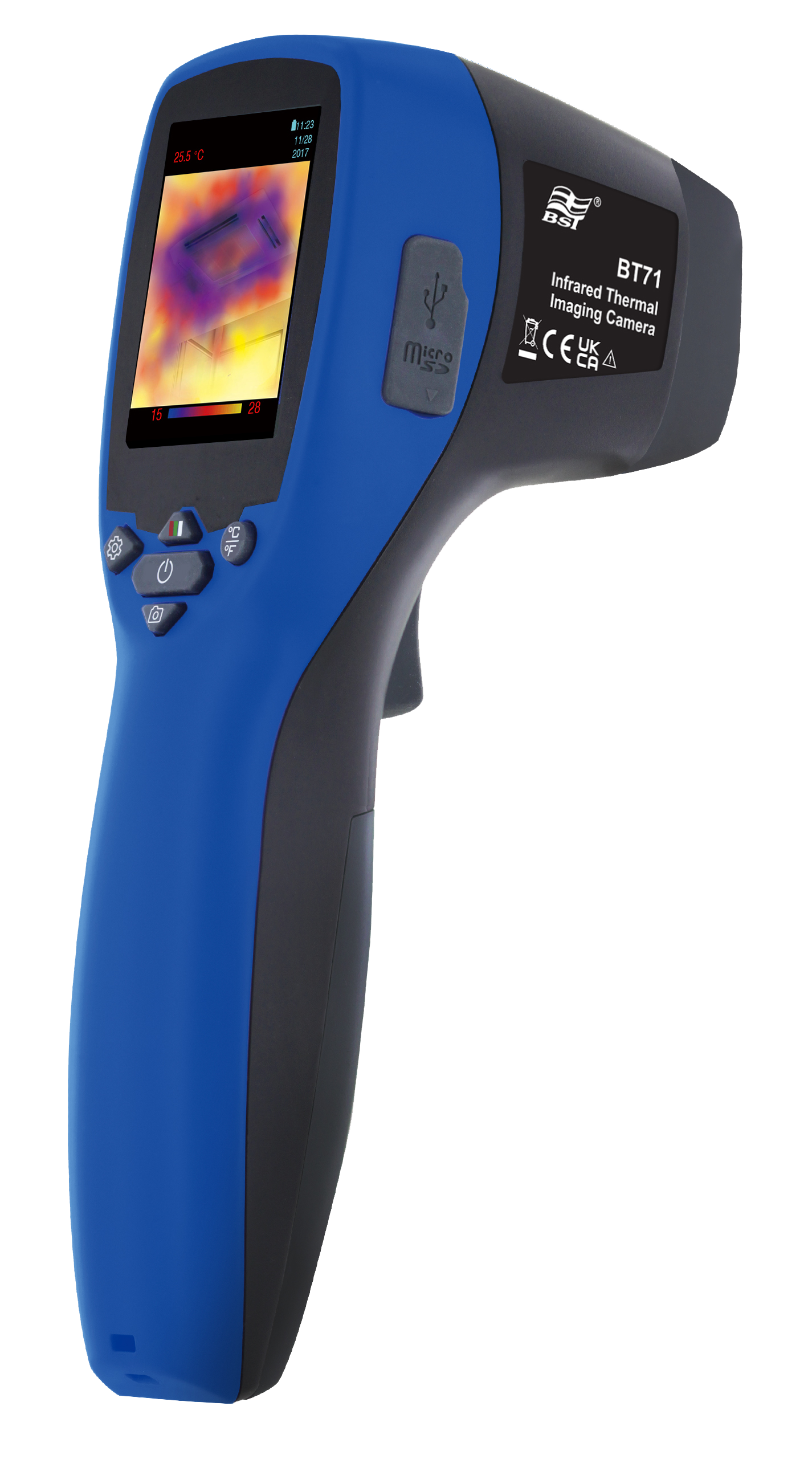Thermal imager applications in the HVAC industry are broad. A technician must check through walls, pipes, and electrical or mechanical systems. An Infrared Thermal imager can help identify thermal patterns of an object's surface to identify leaking pipes, mould formation, mechanical failures, deteriorating electrical components, and inadequate insulation airflow distribution. You can even use a thermal imager to provide energy advice by detecting heating and cooling losses.
Thermal Imagers are gaining in popularity as the technology, portability, and compact designs of the devices improve, making them more cost-competitive and an ideal choice as a helping tool. Thermal imaging cameras render infrared radiation, or heat, as visible light to precisely measure the surface temperature of an object. This infrared energy is a light wavelength undetected by the human eye and allows you to see heat patterns emanating from the object in different colours; the higher the temperature, the greater the infrared radiation emitted. The slightest temperature sensitivities can signal a fatigued or overheated fan motor, condenser or evaporate coils, control valves, and any other component that might not otherwise notice.
HVAC professionals focus on installing, performing, and maintaining residential and commercial heating and cooling systems. They can think of the thermal imager as a helping hand, a tool that complements their know-how to inspect, troubleshoot, and prevent problems before they ever happen.

Let's see how the BT-71 & BT-72 infrared thermal imager cameras help HVAC diagnostics:
Detect Water Leaks
An HVAC technician used a thermal imager to find water-related problems that a regular inspection might not be able to discover. Improperly insulated ducting that hasn't been correctly sealed, wet from condensation, dripping in attics and crawlspaces. Thermal imagers scan temperature changes to help check for leaking pipes and tubes and locate drainage concerns and concealed drip leaks inside heating and cooling systems.
Locate Mold Formation
A problem that coincides with water leakage is mould. Once condensation occurs, mould forms in these locations where the leakage occurred, causing health concerns for a home or building's occupants. Thermal imagers use the externally determined ambient temperature and humidity and the measured surface temperature to calculate each measuring point's relative surface moisture value. Thermal imagers make it possible for HVAC technicians to pinpoint and prevent mould at an early stage.
Predict Electrical and Mechanical Failures
Thermal imaging technology is precious in predicting and preventing electrical and mechanical application failures in HVAC systems before they happen. Using the IRT technology, technicians can evaluate the heat status of low, medium and high voltage systems to detect defective components and connections, prevent unexpected outages, and reduce the risk of costly downtime. In addition, thermal imagers can prevent system damage by detecting heat emissions from mechanical components, indicating an elevated stress level on the system caused by friction, faulty alignment, component tolerances, or a lack of lubricant.
Monitor Airflow
HVAC professionals also find thermal imagers helpful in monitoring air circulation and determining air leakage and temperature distribution issues. Thermal imaging provides a broader system scan by assessing the heat transfer from the surface temperature and invaluable information that the human eye cannot process.
Control Energy Costs
Leaky ductwork can cause 20 - 40% of heating and cooling energy. Thermal imaging can assist HVAC professionals in quickly and effectively evaluating energy losses of heating and cooling systems. With its high-temperature resolution and detailed images, thermal imagers can scan for airtightness and reveal problems like radiant heating failures, insufficient insulation and thermal bridges, and other energy loss through inefficient HVAC systems.
Today's advanced thermal technology benefits HVAC technicians in various practical applications. Thermal imagers like the BT-71 & BT-72, known for their excellent sensitivity and superior image quality, are easy to handle, ergonomically designed, and offer precise infrared images. The BT-72 has 160X120 high-resolution, so it sees detail on the object you are scanning, and you can detect irregularities and weaknesses from a farther distance. Conditions won't always present themselves to the naked eye. Still, with thermal imagers, you can perform an infrared assessment that will provide accurate, real-time information and prevent costly energy and money losses.
FEATURES
- Versatility: HVAC, Power Plant, Automotive, Solar System
- Wide Measurement Range: ( -20 to 350 °C / -4 to 662°F )
- Thermal Image Resolution: ( 32 x 32 )
- Fusion / Visual (Photo/Video Mode)
- Fully Automatic Measurement
- Outstanding Measurement / Accuracy/ Focus Free
- Automatically / Manually Power Off
- Micro SD Card Storage
- 3.7V Li-ion Rechargeable Battery
- IP54 Splash Proof Classification
- CE & UKCA complied
OPTIMIZED APPLICATION
AUTOMATION /
PROCESS CONTROL

BUILDING DIAGNOSTICS /
OCCUPATIONAL SAFETY AND HEALTH

ELECTRICAL /
MECHANICAL

SCIENCE / R&D

SOLAR

HVAC

TECHNICAL SPECIFICATIONS
Description
Thermal Imager Camera
IP Classification
IP54
Thermal Image Resolution
32 x 32
Visual Image Resolution
640 x 480
Infrared Measurement Range
-20 ~ +350oC (-4 ~ +662oF)
Infrared Accuracy (Tamb=20~26oC)
±2% of reading, or 2oC (4oF) whichever is greater
Thermal Sensitivity
0.1oC (0.1oF)
Frame Rate
9Hz
Field of View
33o x 33o
Emissivity
0.95 default adjustable 0.1 to 1 step .01
Focus
Focus free
LCD (inch)
2.8
LCD Type
Colour
Visual Camera
•
Alarm
•
Image Storage
100,000 image for 16G Micro SD card, PNG format
Memory Type
Support Micro SD card up to 32G (Recommend to use the attached 16G Micro SD card)
Spectral Range
8 ~14 um
Interface
USB
Battery Type
3.7V Li-ion rechargeable battery
Battery Life (with backlit)
3 hrs. continuous with backlight default set ON
Due to our policy of continual product development, we reserve the right to amend the specifications of all mentioned products without notice.